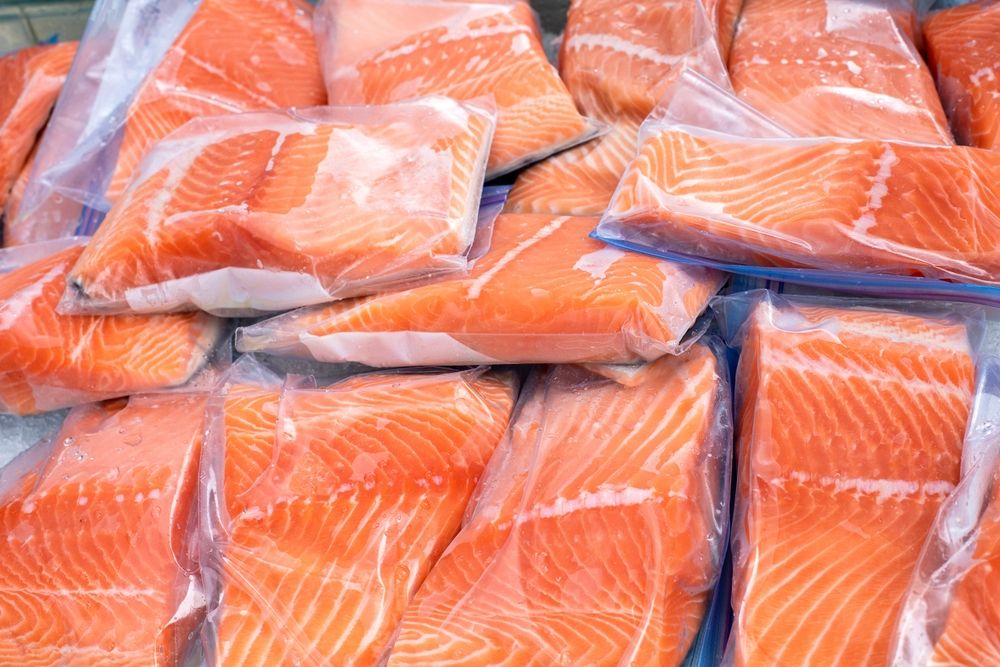Whether it's salmon, cod, mackerel, or tuna, increasing your fish intake offers numerous health advantages. For instance, a comprehensive meta-review in 2021 established a strong connection between higher fish consumption, enhanced cardiovascular health, and a reduced risk of mortality. Packed with protein, vitamins, and minerals, including fish in your diet is a straightforward way to elevate the nutritional content of your meals. Furthermore, fish is low in calories, free of carbs, and rich in omega-3 polyunsaturated fatty acids (PUFAs), which are associated with cognitive function and heart well-being. It is no surprise that Americans rank as the second-largest consumers of fish globally, according to the National Oceanic and Atmospheric Administration.
Beyond these health benefits, there are some unexpected advantages to incorporating more fish into your dietary regimen. To gain deeper insights, we spoke with Destini Moody, RDN, CSSD, LD, a registered dietitian and sports dietitian affiliated with Garage Gym Reviews. She shares 11 compelling reasons why increasing fish consumption can be beneficial. Read on to discover more.
1) Fish is high in Omega-3s.

One of the notable attributes of fish lies in its abundant omega-3 fatty acid content, particularly abundant in fatty varieties such as salmon and mackerel. Omega-3s provide a multitude of health advantages, ranging from bolstering brain function to mitigating inflammation. According to the National Institutes of Health, certain fish stand out as richer sources of omega-3s, including salmon, mackerel, tuna, herring, and sardines.
"Omega-3 fatty acids represent an essential nutrient that the body cannot synthesize independently, yet they hold remarkable potential in combatting chronic inflammation and upholding the health of the brain and heart," as highlighted by Moody. "Recent research even suggests potential benefits for athletic performance. Fish stands as the most potent dietary reservoir of omega-3 fatty acids, and all it takes is consuming one serving of fatty fish one to two times per week to meet the recommended intake."
2) It is low in calories.

Fish offers an ideal base for well-balanced and calorie-conscious meals, boasting a relatively low-calorie content compared to other protein sources. Among the leanest fish varieties are cod, flounder, and haddock. According to the USDA, a 3-ounce serving of cod provides a mere 67 calories.
As Moody points out, "A 3-ounce portion of tilapia contains only 100 calories, in contrast to the nearly 200 calories found in a 3-ounce serving of standard steak. This makes white fish like tilapia a valuable addition to various dietary plans, particularly those geared toward weight loss with calorie control in mind."
3) It is a good source of vitamin D.

Fatty fish selections like salmon and tuna serve as natural reservoirs of vitamin D, a crucial nutrient vital for bone health, immune system function, and overall well-being. Moody points out, "Many may be surprised to learn that there are limited dietary sources of vitamin D. The majority of Americans obtain their vitamin D through fortification, which involves the addition of artificial vitamins, or from dairy products and orange juice. Nonetheless, approximately half of the U.S. population remains deficient in this nutrient. Salmon and herring stand out as fish varieties with the highest vitamin D content, with a single 4-ounce serving of salmon providing 100 percent of your daily recommended intake."
4) Fish is high in protein.

Protein represents a vital macronutrient that plays a pivotal role in muscle development, tissue repair, satiety enhancement, and overall well-being. Moody notes, "An average 3-ounce serving of fish typically contains approximately 20 grams of protein. Fish often boasts a higher protein content compared to other animal protein sources such as beef and chicken because, aside from salmon, most fish varieties are low in fat."
5) It can help you manage hunger.

Given that fish serves as a superb source of lean protein, it excels in curbing hunger and warding off cravings by promoting a sense of fullness. Moody elaborates, "Thanks to its protein content, fish can quell your appetite. Protein is the most satiating macronutrient when compared to carbohydrates and fats. Consequently, it can prolong the feeling of fullness, aiding in weight management and curbing excessive food intake."
6) It can support heart health.

Regularly incorporating fish into your diet has been associated with significant cardiovascular advantages, attributable to its omega-3 fatty acids that contribute to reduced blood pressure, lowered triglyceride levels, and the prevention of irregular heart rhythms.
"Studies have revealed that individuals who include fish in their diet exhibit the lowest risk of experiencing heart attacks and strokes, two prevalent causes of premature mortality across the globe," Moody points out. "Fish can serve as a healthier alternative to protein sources high in saturated fats, such as beef and pork, which is notably beneficial for heart health."
7) It is a rich source of iodine.

Saltwater fish represent exceptional sources of iodine, an essential mineral crucial for thyroid function and metabolic well-being. A study has indicated that saltwater fish may contain between five to ten times more iodine than their freshwater counterparts. Moody emphasizes, "In addition to regulating appetite and supporting the immune system, iodine plays a pivotal role in thyroid function. Unfortunately, there are limited dietary sources of iodine, as it primarily exists in abundance in seawater. Thankfully, fish provide an excellent means of obtaining this crucial nutrient."
8) It's a good option for those lowering their meat intake.

For individuals primarily adhering to plant-based diets with minimal animal protein intake, fish can serve as an excellent choice for lean protein consumption on occasional occasions. Moody explains, "Some of the world's healthiest dietary patterns emphasize abundant fruit and vegetable consumption alongside modest amounts of lean animal protein. These diets, referred to as plant-based diets, are renowned for their health-promoting attributes as they permit ample antioxidant intake from plants while also furnishing essential nutrients derived from animal protein, such as iron and B12, without excessive reliance on animal products. Fish aligns with this dietary approach due to its lower saturated fat content compared to most other animal protein sources, thus enhancing the nutritional merits of plant-based diets."
9) Fish is highly versatile.

The kitchen's versatility with fish, from grilling to poaching to creating tacos and salads, positions it as a culinary essential. Moody notes, "What makes fish so appealing is its adaptability, allowing you to infuse variety into your meals and keep culinary monotony at bay. For instance, tilapia can be transformed into delectable tacos, salmon can be delicately flaked into pasta dishes, and sardines can serve as a savory addition to green salads."
10) It is affordable.

Despite the prevalent misconception that seafood is costly, cost-effective fish alternatives are readily available—and they don't entail compromising nutritional value.
Moody clarifies, "The perceived high cost of salmon and swordfish frequently dissuades individuals from incorporating fish into their regular diet. Nevertheless, it's important to realize that fish is accessible in canned and frozen varieties, offering identical nutrients and advantages as fresh fish. Canned tuna, mackerel, and salmon represent budget-friendly options for introducing fish into your diet, and they boast extended shelf lives, reducing food wastage and saving you money."
11) It's easy to cook.

Whether you prefer your fish grilled, baked, or pan-seared, it can easily find its way into your weekly meal plan. This convenience is particularly advantageous for individuals with hectic schedules aiming to incorporate a healthy, lean protein source. Moody underscores, "The majority of fish varieties boast short cooking durations and can be prepared through baking, frying, searing, boiling, and even grilling. Whitefish, in particular, possesses a gentle flavor profile, rendering it adaptable to a range of seasonings that can cater to the preferences of even the most discerning eaters."

